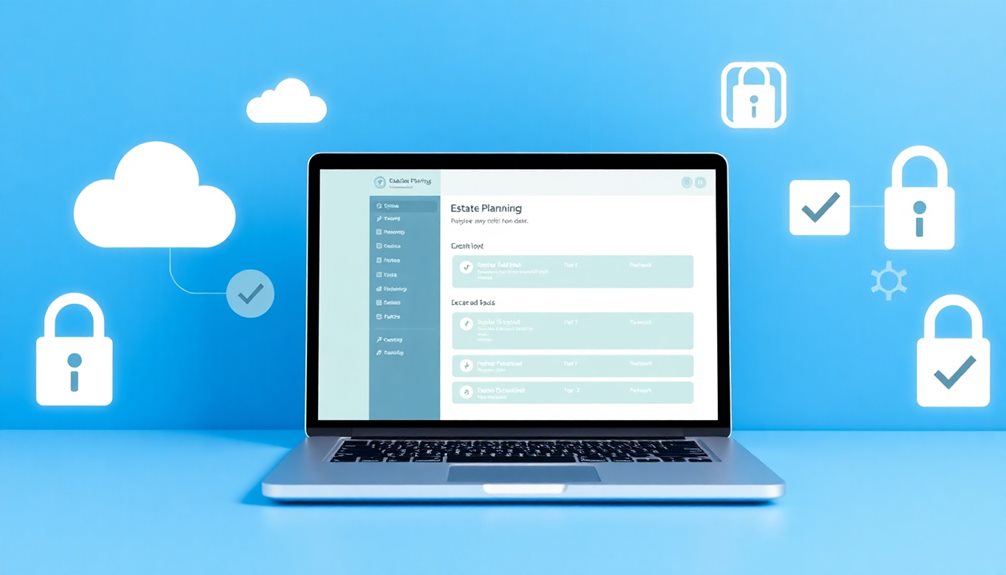Digital estate planning services help you manage your online assets and guarantee your wishes are respected after you're gone. They focus on organizing digital assets like social media accounts, online banking info, and even cryptocurrencies. By taking steps like designating beneficiaries and appointing a digital executor, you can protect your legacy and reduce stress for your loved ones. These services also help safeguard against identity theft by securing your sensitive information. With proper planning in place, you'll have peace of mind knowing your digital life is in order. Discover more about these essential services and how they can benefit you.
Key Takeaways
- Digital estate planning helps manage and protect digital assets like social media accounts, emails, and cryptocurrencies after death or incapacitation.
- Appointing a digital executor ensures a trusted individual can manage digital assets according to your wishes, reducing family stress.
- Regularly updating a digital estate plan prevents unauthorized access and protects against identity theft by securing sensitive information.
- Designating beneficiaries for each digital asset guarantees proper transfer and clarity regarding responsibilities for asset management.
- Utilizing digital planning tools and vaults enhances organization and security of digital assets, ensuring they are accessible to designated individuals.
Definition of Digital Assets

When you think about digital assets, consider them as any electronic records or files you own and store online or on your devices. These can include social media accounts, emails, online banking information, and even cryptocurrencies.
With over 70% of adults owning digital assets, it's clear that understanding their significance is essential for effective estate planning. In an era where personalized learning in classrooms is becoming increasingly important, individuals must also recognize the need for tailored approaches to managing their digital legacies.
Unlike liquid funds sitting in your bank, digital assets require specific access points, such as passwords and security questions, to manage effectively. That's where having a digital estate plan becomes imperative. This plan outlines how your digital assets should be handled after your death or incapacitation, ensuring your executor has the necessary tools to manage these valuables.
Without proper documentation, your heirs may find it challenging, if not impossible, to access and manage your digital assets. They could be left with lost accounts or inaccessible files.
As a result, taking the time to organize and document your digital estate is critical. By doing so, you not only protect your digital legacy but also make the process smoother for your loved ones during a difficult time.
Importance of Digital Estate Planning

Digital estate planning is essential for managing access to your online accounts and assets, ensuring your loved ones won't struggle to retrieve important information after you're gone.
It also serves as a safeguard against identity theft, protecting your sensitive data from falling into the wrong hands.
By incorporating elements such as budgeting strategies for future expenses related to digital assets, you can further enhance your planning.
Managing Digital Asset Access
Managing access to your digital assets is fundamental in today's technology-driven world, especially since over 70% of adults own assets that require careful management.
Digital assets include everything from social media accounts to online banking and digital files, which can also be impacted by Louisiana Alimony Laws if digital assets are part of a divorce settlement. Creating a digital estate plan helps guarantee your heirs can manage online accounts according to your wishes for your digital legacy.
One critical step is appointing a knowledgeable digital executor. This person will navigate the complexities of digital asset management, guaranteeing your estate planning documents clearly outline their responsibilities.
By providing detailed instructions, you alleviate stress for your family, making it easier for them to access and manage your assets after your passing.
Regularly updating your digital estate plan is essential as your online accounts and asset distribution may change over time. This practice minimizes the risks of unauthorized access, guaranteeing your wishes are honored and your digital assets remain secure.
Without proper planning, valuable digital assets could be lost or inaccessible, leading to disputes among your heirs. By taking these proactive steps, you can protect your digital legacy and provide peace of mind for your loved ones.
Protecting Against Identity Theft
Regularly updating your digital estate plan is essential for protecting against identity theft. With over 70% of adults owning digital assets, it's important to manage sensitive information and access credentials effectively.
A well-structured digital estate plan helps you secure storage of your online accounts and personal data, greatly reducing the risk of hacking and fraud after your passing.
By designating a digital executor, you guarantee that a trusted individual can manage your digital assets according to your wishes. This proactive step not only safeguards your online presence but also prevents potential identity theft from unmonitored accounts.
Clear instructions for your digital executor are fundamental for effective estate management, allowing them to act on your behalf and protect your legacy.
Remember to regularly review and update your digital estate plan to reflect any changes in your online accounts or security measures. This ongoing diligence is key to maintaining protection against identity theft.
Alleviating Family Stress
Establishing a digital estate plan not only protects against identity theft but also greatly eases the burden on your family during a challenging time. With over 70% of adults owning digital assets, it's essential to engage in effective digital estate planning. A well-structured plan provides clear instructions for managing these assets, which can alleviate stress for your family members after your passing.
Without a digital estate plan, your heirs may struggle to access valuable digital assets, leading to potential disputes and added emotional strain. By outlining the distribution of your digital assets and designating a digital executor, you guarantee that your beneficiaries can seamlessly shift into managing your online accounts. This foresight preserves both the financial value and personal memories tied to these assets.
Utilizing secure storage solutions for your passwords and account information also plays a fundamental role in this planning process. By taking these steps, you greatly lessen the emotional and logistical challenges your family faces.
Embracing digital estate planning not only protects your legacy but also provides peace of mind for both you and your loved ones.
Steps to Create a Digital Plan

To create your digital estate plan, start by taking an inventory of all your digital assets, such as social media accounts and online banking.
Next, designate beneficiaries for each asset to guarantee they're managed according to your wishes.
Inventory Digital Assets
When you start planning your digital estate, the first step is to create a thorough inventory of all your digital assets. This guarantees nothing gets overlooked and helps your executor manage your affairs smoothly.
To get started, consider including:
- Social media accounts (Facebook, Instagram, Twitter)
- Online banking and investment accounts
- Email accounts (Gmail, Outlook, etc.)
- Cloud storage services (Google Drive, Dropbox)
Document not only the types of digital assets but also their access information, including usernames, passwords, and security questions. Make certain to keep this sensitive data in a secure format.
Regularly updating your inventory is essential, as over 70% of adults have digital assets that may change over time.
Categorizing these assets based on their importance or monetary value can streamline their management and distribution in your digital estate planning.
Utilizing digital estate planning tools or services can help facilitate this inventory process, guaranteeing that all information is organized and easily accessible for your executor when the time comes.
Designate Beneficiaries
After you've compiled an inventory of your digital assets, the next important step is designating beneficiaries for each one. This guarantees that your wishes are honored and that each asset is transferred smoothly. You'll want to specify which beneficiaries will gain access to accounts like social media, online banking, and cloud storage.
To help you get started, here's a simple table to organize your thoughts:
| Digital Asset | Designated Beneficiary |
|---|---|
| Facebook Account | John Doe |
| Online Bank Account | Jane Smith |
| Google Drive | Emily Johnson |
| Twitter Account | Mark Lee |
| Amazon Account | Sarah Brown |
Clear instructions regarding the management and distribution of your digital assets can greatly prevent disputes among heirs. Make sure your beneficiaries are informed about their roles and responsibilities. They'll need to prepare for managing the assets they inherit. Additionally, regularly updating your list of designated beneficiaries is key to keeping your digital estate planning relevant as relationships and financial situations change.
Appoint Digital Executor
Appointing a digital executor is an essential step in your digital estate planning process. This person will manage your digital assets according to your wishes after you pass.
Here are four key considerations for appointing a digital executor:
- Choose a Trusted Individual: Select someone knowledgeable about digital platforms and privacy laws.
- Include in Your Estate Plan: Confirm your digital executor is designated in your will or digital estate plan to provide clear legal authority.
- Provide Thorough Access Instructions: Equip your executor with detailed guidance on how to retrieve passwords and manage sensitive information securely.
- Maintain Regular Communication: Keep your executor updated on any changes to your digital estate plan, so they're prepared to fulfill their responsibilities.
Legal Considerations to Note

Understanding the legal considerations involved in digital estate planning is important, as digital asset laws can differ widely from one state to another. You need to be aware of the Revised Uniform Fiduciary Access to Digital Assets Act (RUFADAA), which allows fiduciaries to manage digital assets based on your wishes. However, local adaptations may exist that require familiarity with your state's regulations.
Appointing a knowledgeable digital executor is essential. They should understand digital assets and guarantee compliance with privacy laws and service agreements. Legal authorization, either through a will or trust, is crucial for heirs to access digital assets, as these may not transfer automatically without explicit permission.
To help you navigate these considerations, here's a quick reference table:
| Legal Aspect | Importance | Involved Parties |
|---|---|---|
| Digital Assets | Guarantee proper management and transfer | Digital Executor |
| Legal Authorization | Grants access to digital assets | Estate Attorney |
| RUFADAA Compliance | Aligns with state-specific laws | Digital Executor |
| Clear Instructions | Prevents disputes among heirs | You and Estate Attorney |
| Thorough Digital Estate | Holistic view of all assets | Estate Attorney |
Make sure to consult an estate attorney for tailored advice.
Tools for Digital Estate Planning

When it comes to digital estate planning, utilizing the right tools can make all the difference in managing your online assets. Here are four essential tools to take into account:
- Digital estate planning tools: Services like Everplans and Final Security help you manage your digital assets with features like inventory management and secure storage.
- Password managers: Tools such as LastPass and 1Password allow you to securely store and share your login information with appointed digital executors, reducing the risk of unauthorized access.
- Online platforms: Many platforms offer legal templates for wills and trusts that include clauses for digital asset management, helping you formalize your digital estate plans effectively.
- Automated notifications: Certain digital estate planning services can send updates to your designated contacts upon your death or incapacitation, ensuring timely communication of important information.
Best Practices for Security

To protect your digital assets, secure password management is essential.
You should regularly update your digital estate plan and utilize digital vaults for storing important documents.
Secure Password Management
Effective password management is crucial for safeguarding your digital estate, especially in an era where cyber threats are rampant.
By following best practices, you can secure your online accounts and protect your digital assets. Here are four key strategies to contemplate:
- Use a Password Manager: Utilize a reputable password manager to securely store and encrypt all your passwords. This reduces the risk of unauthorized access to your digital assets.
- Implement Two-Factor Authentication (2FA): Whenever possible, enable 2FA on your accounts. This adds an extra layer of security beyond just passwords, markedly enhancing your protection.
- Create Strong, Unique Passwords: Aim for passwords that are at least 12 characters long, mixing letters, numbers, and special characters. Avoid reusing passwords across different online accounts to minimize the impact of potential data breaches.
- Conduct Periodic Audits: Regularly review your stored passwords and access information. Ascertain that any unused accounts are deleted or secured to reduce vulnerabilities.
Regular Plan Updates
How often do you think about updating your digital estate plan? Regular updates are essential to keeping your digital estate plan relevant and effective. Life changes, like marriage, divorce, or welcoming a child, can greatly impact your digital assets, so it's wise to review your plan at least annually or after major events.
By keeping your inventory of digital assets up to date, you reduce the risk of missing valuable items during estate settlement, which could lead to disputes or financial loss for your heirs. Additionally, regular updates enhance your security against unauthorized access. Changing passwords and access information regularly is critical for protecting sensitive digital assets.
To simplify this process, consider using password managers. They can help you manage and update access information securely, guaranteeing that your digital estate plan remains organized and protected. They can also assist in answering those pesky security questions that often come up when accessing accounts.
Digital Vault Utilization
Utilizing a digital vault is essential for securely managing your sensitive information, including passwords and estate planning documents.
These secure storage solutions protect your digital assets with encryption and guarantee that only authorized individuals gain access.
Here are some best practices for using your digital vault effectively:
- Regularly Update Your Vault: Keep your passwords and estate planning documents current to reflect any changes in your accounts or services.
- Enable Two-Factor Authentication (2FA): This adds an extra layer of security, making it harder for unauthorized users to access your vault.
- Use Strong, Unique Passwords: Protect your vault with complex passwords that are hard to guess, and avoid reusing them across different platforms.
- Inform Appointed Digital Executors: Confirm that trusted individuals know how to access your digital vault in case of emergencies, streamlining digital asset access when managing your digital estate.
Appointing a Digital Executor

When planning for the future, appointing a Digital Executor is an essential step in managing your digital estate. This person takes on the responsibility of executing your digital estate plan, ensuring your digital assets are handled according to your wishes.
While not legally binding in most states, designating a Digital Executor offers clear guidance and accountability for managing digital assets.
Selecting a trusted individual who understands digital technology and the intricacies of online accounts is significant. This appointed digital representative will assist your primary executor in steering through the digital aspects of your estate.
A well-defined role for the Digital Executor can prevent disputes among heirs and facilitate a smooth changeover of ownership.
Managing Digital Asset Access

To effectively manage digital asset access, it's crucial to create a thorough inventory of all your digital assets, including social media accounts, online banking, and cloud storage.
This inventory will be an important part of your estate plan, ensuring nothing is overlooked. Here are four key steps to reflect upon:
- Designate a digital executor: Choose someone trustworthy to manage and distribute your digital assets according to your wishes.
- Utilize secure storage: Use password managers or encrypted vaults to protect sensitive access information, ensuring only authorized individuals can retrieve it.
- Keep your inventory updated: Regularly revise your digital estate plan to reflect any changes in online accounts or asset distribution, minimizing risks of inaccessibility or unauthorized access.
- Legal formalization: Include your digital asset instructions in a will or trust. This provides clarity on how your digital assets should be handled and helps prevent disputes among heirs.
Risks of Not Planning

Neglecting digital estate planning can lead to significant challenges for your heirs. Without a clear plan, your loved ones might struggle to access valuable digital assets, risking financial losses and potential disputes over inheritance.
The absence of a well-documented strategy can also open the door to identity theft, as unauthorized individuals may exploit your online accounts and sensitive information after you're gone.
Failing to secure your digital accounts means treasured memories, like photos and videos, might be permanently lost and irretrievable. Additionally, without a designated digital executor, managing your online presence can become complicated, causing delays and confusion in carrying out your wishes regarding your digital legacy.
Estate planning is essential not just for physical assets but for your digital assets as well. If your digital assets aren't recognized during the probate process, it can create legal complications that prolong settlement and burden your grieving family members.
Ultimately, the risks of not planning can have lasting impacts, affecting both your heirs' financial stability and their emotional well-being. Planning ahead guarantees your digital legacy remains intact and your wishes are honored.
Professional Services Available

Digital estate planning services provide essential support for managing your online assets effectively. By leveraging these professional services, you can guarantee your digital legacy is secure and well-organized.
Here's a thorough list of what's typically available:
- Digital Asset Audits: Professionals verify the completeness and accuracy of your digital inventory, helping you avoid overlooking valuable assets.
- Legal Guidance: Estate planning attorneys offer insights into state-specific regulations, making sure your plans comply with laws like the Revised Uniform Fiduciary Access to Digital Assets Act (RUFADAA).
- Drafting Legal Documents: Financial advisors specialized in digital assets can create estate plans that include clauses for managing these assets, facilitating seamless conversions for your heirs.
- Secure Storage Solutions: Many platforms provide features like secure storage, legacy contact designation, and automated notifications to keep your contacts informed of changes upon your death or incapacitation.
Frequently Asked Questions
What Is Digital Estate Planning?
Digital estate planning's about managing your online assets, ensuring they're accessible and properly handled after you're gone. It helps prevent complications for your loved ones and gives them clear guidance on your digital wishes.
Should I Include Digital Assets in My Will?
Think of your digital assets as seeds planted in a garden. You should include them in your will to guarantee they flourish according to your wishes, avoiding chaos and ensuring your legacy thrives even after you're gone.
Who Inherits Digital Assets?
When someone passes away, digital assets typically go to their heirs, but without clear instructions in a will, accessing those assets can be challenging. Designating a digital executor helps guarantee your wishes are honored.
Are Bank Accounts Considered Digital Assets?
No, bank accounts aren't considered digital assets. Instead, the online platforms you use to manage those accounts are. Focus on securing access to those platforms for proper management of your financial resources.
Conclusion
In today's digital age, over 60% of people don't have a plan for their online assets after they pass away. Don't let your cherished memories and important information fall into the wrong hands or be lost forever. By taking the time to create a digital estate plan, you're not just protecting your legacy; you're ensuring that your loved ones can navigate your online world with ease. Start planning today and give yourself peace of mind for tomorrow.









